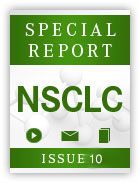Marianne Davies, NP, on Assessing Immunotherapy Toxicities in Lung Cancer Patients
Marianne Davies, NP, discusses making patients' oncology team their first line of contact should they develop any toxicities related to receiving treatment. Davies says this is important for patients so that the oncology team can assess whether it is an immune-related side effect, or an issue that can be dealt with by their primary care physician.
Marianne Davies, NP, Assistant Professor of and Clinical Instructor in Nursing, Yale Cancer Center, discusses why a patient's oncology team should be their first line of contact should they develop any toxicities related to receiving treatment. Davies says this is important for patients so that the oncology team can assess whether they are experiencing an immune-related side effect, or an issue that can be dealt with by their primary care physician.
Davies adds that some toxicities, such asn inflammatory pneumonitis, could appear as though it is simply an upper respitory infection, leading patients and their families to believe that the best course of action would be to see their primary care physician. Some resources for patients that may help them get a better grasp on symptoms of these toxicities include patient forums and online educational materials.

Survivorship Care Promotes Evidence-Based Approaches for Quality of Life and Beyond
March 21st 2025Frank J. Penedo, PhD, explains the challenges of survivorship care for patients with cancer and how he implements programs to support patients’ emotional, physical, and practical needs.
Read More